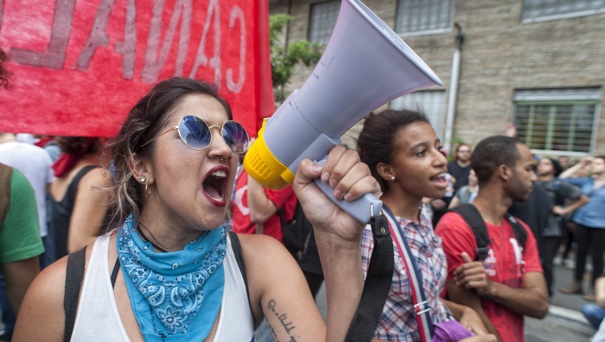Wise Bread Picks
Protests are breaking out all over the U.S. these days. For frustrated Americans, taking part in a peaceful demonstration can help restore a sense of personal control. And protesting works. Not always, and sometimes not to the degree that people wish, but history is full of examples of how public movements have brought real and positive change.
If you’re thinking of joining a protest, it helps to understand just what the personal repercussions might be. Not that you should always let fear rule out over conscience. But consider these unexpected costs of activism, so you know exactly what you’re getting yourself into.
1. You can jeopardize your career
You have every right to protest whatever you want. It’s what makes America, and many other civilized countries, great. However, just because it’s your right doesn’t mean your current or future employer will look favorably upon your decision to speak out. Employers may not agree with your political stance.
Even if they do, they may worry clients or the public will look down on it. And with smartphones and social media a staple of society, chances are, you’ll be caught on camera. If you are in any kind of position that is public-facing, be it a teacher, a lawyer, or a public relations manager, you could be on shaky ground.
Almost all U.S. states are “at-will employment” states, meaning employers can terminate you for any reason and without warning. Unless there are state laws, or company or union policies in place that specifically protect you, you could be fired for engaging in lawful political activity. (See also: 4 Financial Reasons to Keep Your Political Views Private)
2. You may need to take time off work
Protesting is usually not convenient. It is frequently centered around an event or day that has meaning, and that means it will often fall on a work day. For those of us who have jobs that are flexible with hours — or allow vacation and personal days for such things — no problem.
But you may not have that luxury. Can you afford to take a day off without pay? Can you afford for that to become two, three, or four days without pay if the protest continues to gain momentum? Some people maintain that the monetary cost is nothing compared to the moral cost of staying silent, but remember, that noble reason will not fly with the bank when the mortgage is overdue.
3. Your protest may put you in the spotlight
Protests can turn a relatively unknown issue into something that everyone is talking about. That’s good in that it leads to a greater chance for change.
Just make sure you’re prepared to have the spotlight turned on you personally as well, even if it’s only within your circle of friends and acquaintances. The 2016 election left the country more divided than any time in recent memory, so once you make your stance known, you will most likely be met with tension from the other side. Ask any outspoken person with a large following on Twitter, and they’ll tell you how often their political opinions are met with threats. Not that you should let fear of internet trolls keep you from defending the greater good, but it is something to be aware of.
4. You could get arrested … or worse
Peaceful protests don’t always stay that way. When two sides come together with vastly opposing views, tempers flare. When authorities are dispatched to keep the peace, it can be the start of unrest, which can turn violent.
Hopefully, you will be involved in a peaceful protest that makes its point without leading to chaos or physical harm. But this is not an ideal world. There may be fights. You might be arrested because of a simple miscommunication, intentional abuse of police power, or just for being in the wrong place at the wrong time. You may even be injured, perhaps severely. Many people believe these risks are worth taking, but if you have a family that depends on you, think twice.
5. You could fall out with family and friends
Polarizing opinions can be fatal for friendships and family dynamics. A recent news article told the story of how a 22-year marriage ended over the election of Donald Trump.
Attending a protest for anything could cause disruptions in your relationships, leading to arguments and irreparably hurt feelings. While it is important to have your own opinions, voicing them publicly can have consequences. Just make sure you are prepared for the fallout.
No matter which side your political views align with, you probably will never regret fighting for what you believe in. And fear of anything listed above certainly is not a reason to avoid political activism entirely. Just know what you’re up against going in, so you’re ready if any of these repercussions do begin to surface.





